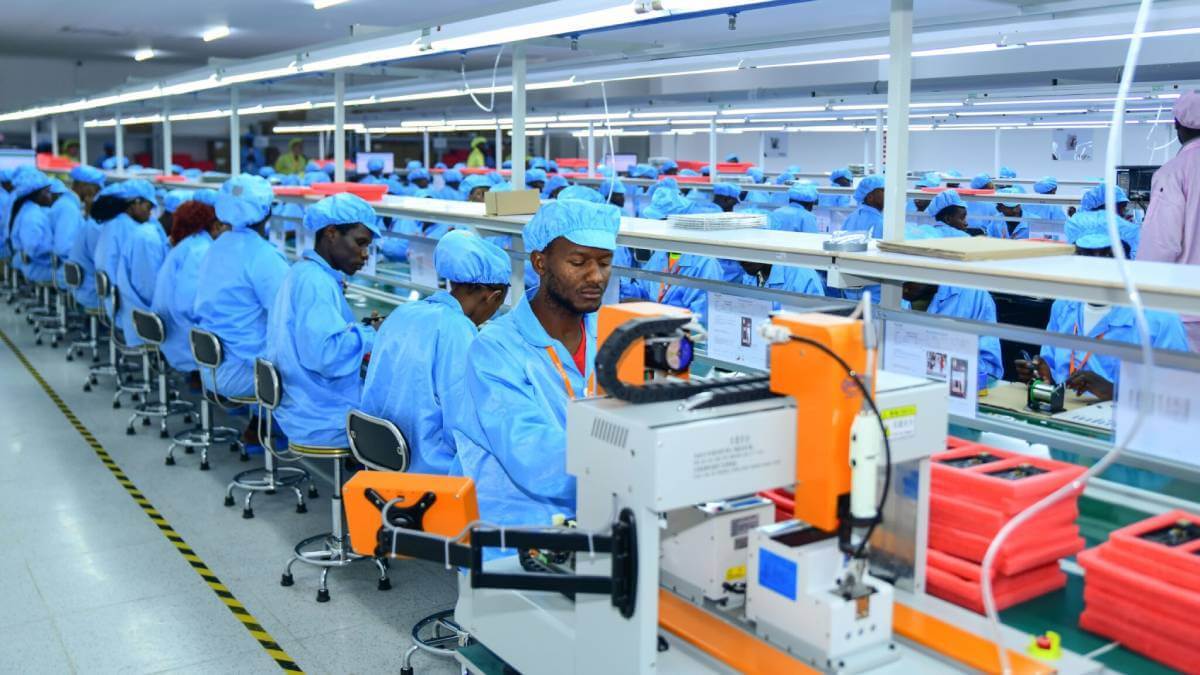Kenya opens smartphone assembly factoryKenya opens smartphone assembly factory
Kenya has officially opened a local device assembly factory with capacity to produce up to 3 million smartphones per year at a price point of around $50.

Kenya has officially opened a local device assembly factory with capacity to produce up to 3 million mobile phone units annually.
The East Africa Device Assembly Kenya Limited (EADAK), located in Athi River in Machakos County just outside of Nairobi, was officially opened by Kenyan President William Ruto this week who said that the Kenyan government is prioritizing the production of affordable smart devices to boost digital access in Kenya.
The plan to produce local low-cost devices was announced back in May 2023 and the facility is a joint venture of local mobile operators Safaricom and Jamii Telecom and Chinese manufacturer Shenzhen TeleOne Technology.
President Ruto said that "going digital on a large scale" will spur Kenya's growth and will also bring the country closer to realizing its development agenda.

Kenyan President William Ruto tries his hand at device assembly.(Source: The Presidency of the Republic of Kenya)
"This assembly plant will support government's agenda to enhance digital inclusion in the country. We have been able to achieve affordability through a collaborative approach that comprises industry partnership and favorable government policies," said Joshua Chepkwony, chairman of EADAK and chairman and CEO of Jamii Telecom.
The locally assembled devices will be available across Kenya at Faiba shops, dealer stores, Safaricom shops and on the Masoko online platform and will retail from 7,499 Kenyan shillings (US$50) each.
The anchor smartphone devices at launch will be the 4G-enabled Neon 5 inch "Smarta" and a 6.5 inch "Ultra," with more devices in the range to be launched in the next few months.
The plant also plans to produce a locally assembled tablet device.

Safaricom CEO Peter Ndegwa and Kenyan President William Ruto show off a new smartphone from the EADAK which will retail from around US$50.(Source: Safaricom)
The factory expects to generate between 300 and 500 direct jobs, foster local talent development and contribute to the country's economic growth.
"The launch of EADAK reaffirms our belief in the power of connectivity to transform lives and drive economic progress. This partnership underscores our relentless pursuit to expand 4G access and empower Kenyans through affordable, high-quality smartphones, create employment opportunities and grow our economy," added Safaricom CEO Peter Ndegwa.
Safaricom is Kenya's biggest mobile operator with about 67% market share at the end of September 2023, according to statistics from market research company Omdia, a sister company of Connecting Africa.
Meanwhile Jamii Telecom is the country's smallest operator with less than 1% market share. Airtel Kenya had almost 27% market share and Telkom Kenya had 5.6% of the market over the same period.
Made in Africa smartphones
EADAK claims to be the first of its kind facility in East Africa, which is half true.
The Mara Corporation launched the Mara Phones smartphone factory in Kigali, Rwanda back in October 2019 – although this was touted as a device manufacturing plant and not just an assembly plant like EADAK. Mara's devices were also more high-end retailing at between $130 and $190 at the launch.
Follow Connecting Africa on our new X account @connect__africa to get the latest telecoms and tech news across Africa.
The Mara Group opened another high-tech smartphone manufacturing plant in Durban, South Africa in October 2019 but the facility faced financial difficulties due to the COVID-19 pandemic and its creditors put it up for auction in February 2022.
*Top image is of workers at the East Africa Device Assembly Kenya facility in Athi River, Machakos County, Kenya. (Source: The Presidency of the Republic of Kenya).
— Paula Gilbert, Editor, Connecting Africa


.jpg?width=700&auto=webp&quality=80&disable=upscale)

_(1).jpg?width=700&auto=webp&quality=80&disable=upscale)

.jpg?width=700&auto=webp&quality=80&disable=upscale)
.jpg?width=700&auto=webp&quality=80&disable=upscale)
.jpg?width=700&auto=webp&quality=80&disable=upscale)
.jpg?width=700&auto=webp&quality=80&disable=upscale)
.jpg?width=800&auto=webp&quality=80&disable=upscale)


.jpg?width=700&auto=webp&quality=80&disable=upscale)